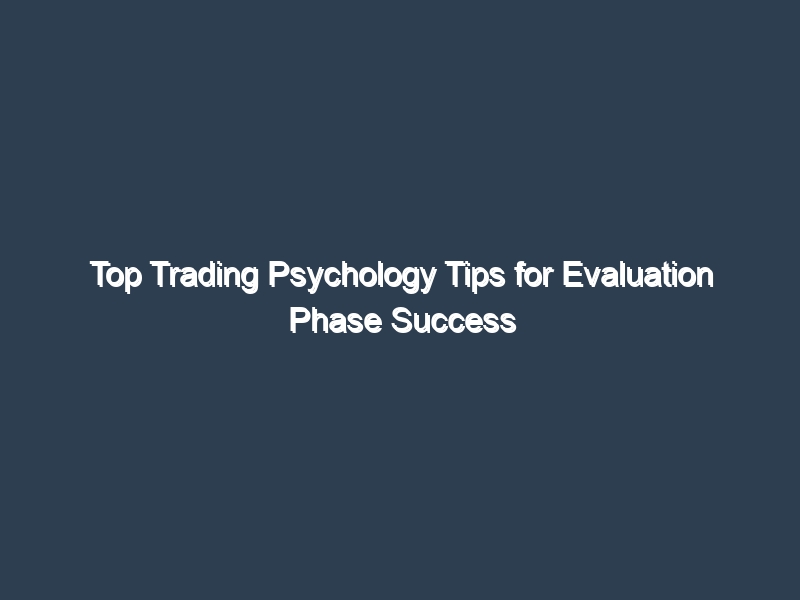
13 Feb
Top Trading Psychology Tips for Evaluation Phase Success
Trading involves much more than just numbers and charts; it is fundamentally a mental game where psychology plays a critical role.
The evaluation phase is essential for trading success, providing an opportunity for you to reflect on past decisions, learn from your experiences, and refine your strategies.
This guide underscores the significance of psychology in trading and offers key insights for effectively navigating the evaluation phase. By developing a solid trading plan, managing your emotions, and setting realistic goals, you can enhance your trading journey and significantly improve your chances of success.
Understanding the Importance of Psychology in Trading
In the world of trading, understanding the importance of psychology is crucial for achieving success. Your trader mindset will be shaped by emotional control and self-awareness, which significantly influence your decision-making and overall performance.
Psychological resilience is pivotal for navigating the complexities of the market, while recognizing and mitigating cognitive biases can enhance your trading strategies. Mastering emotional regulation will not only improve your focus but also cultivate a growth mindset that adapts to market sentiment and fluctuations.
Cultivating emotional intelligence allows you to assess your feelings and reactions in stressful situations, enabling you to make more informed choices that prioritize rational analysis over impulsive actions.
Self-reflection encourages you to evaluate past trades and learn from both successes and failures, creating a feedback loop that sharpens your strategies over time.
By implementing mental strategies such as visualization and meditation, you can develop a more disciplined approach to risk management, ensuring that your emotions do not overshadow logical reasoning.
Ultimately, embracing these psychological factors equips you with the tools to face the unpredictable nature of financial markets with confidence and agility.
The Evaluation Phase of Trading
The evaluation phase of trading is a crucial step in understanding your trading performance and plays a significant role in achieving your trading goals.
During this phase, you have the opportunity to engage in self-assessment, allowing you to analyze your success metrics and identify areas needing improvement.
By employing performance evaluation techniques, you can effectively measure your trading outcomes and refine your strategies for future trades, thereby ensuring better risk management and enhanced emotional stability.
What is the Evaluation Phase?
The evaluation phase is a structured approach that you can utilize to assess your trading strategies and performance metrics. This phase involves a thorough analysis of past trades, allowing you to engage in self-reflection and identify successful behaviors, as well as areas that require improvement.
By implementing a feedback loop, you can make informed decisions that enhance your emotional preparedness and discipline during future market interactions.
Journaling your past trades serves as a vital component in this evaluation process, enabling you to document your thoughts, feelings, and decisions made at the inception of each trade. This practice not only illuminates behavioral patterns that may have influenced outcomes but also fosters greater accountability by highlighting the emotional responses associated with both wins and losses.
Through this reflective approach, you can devise more effective strategies, thereby strengthening your resolve and emotional stability—essential qualities for navigating the often tumultuous trading landscape.
Top Tips for Success in the Evaluation Phase
Achieving trading success during the evaluation phase necessitates the implementation of several key strategies that focus on emotional control and discipline techniques.
By concentrating on learning from mistakes and applying effective trading education, you can refine your approaches and improve your overall performance.
Furthermore, this phase promotes the development of mental toughness and adaptability, both of which are crucial for managing trading risks and maintaining confidence.
1. Develop a Trading Plan
A well-structured trading plan serves as the foundation for your successful trading by outlining clear goals and effective risk management strategies. It encompasses various trading strategies tailored to your unique approach, ultimately enhancing your performance.
This plan not only provides clarity and focus but also acts as a guide during the evaluation phase, allowing you to assess your alignment with your objectives.
In developing an effective trading plan, goal setting plays a pivotal role, enabling you to define realistic and measurable targets that serve as motivation throughout your trading journey. Understanding your risk appetite is equally essential; it give the power tos you to make informed decisions that align with your comfort level and financial situation.
Adaptability is also crucial; the market landscape is continually evolving, and your trading plan must evolve accordingly.
By embracing these critical components, you create a roadmap that not only enhances your trading psychology but also fosters confidence in your decisions, leading to more consistent results.
2. Practice Discipline and Patience
Discipline and patience are essential attributes for any trader, significantly influencing emotional control and overall trading habits. By practicing discipline, you can adhere to your trading plans and avoid impulsive decisions driven by cognitive biases.
Cultivating patience enables you to wait for optimal trading opportunities, resulting in improved market analysis and successful outcomes.
When faced with market volatility, possessing these traits can be the difference between frantic selling and strategic holding. For instance, a disciplined trader remains committed to their exit strategy during a market downturn, while others may panic and sell at a loss.
Similarly, a patient trader understands the importance of timing and chooses to wait for a favorable trend before entering the market, ultimately increasing their chances of profit.
The emotional stability derived from discipline and patience leads to reduced stress levels, allowing you to maintain a clear mind and make informed decisions rather than being swayed by fleeting emotions.
3. Manage Your Emotions
Effective emotional control is crucial for managing the psychological barriers that can impede your trading performance. By understanding and regulating your emotional triggers, you can enhance your emotional intelligence, which supports effective stress management and sound decision-making.
This self-awareness cultivates a healthier trader mindset, enabling you to engage in more stable and confident trading behavior.
Techniques such as cognitive restructuring can assist you in reevaluating negative thought patterns and replacing them with more constructive perspectives. Additionally, visualization practices allow you to mentally rehearse successful trading scenarios.
By implementing these strategies, you can enhance your emotional awareness and foster a more positive trading environment. Maintaining a balanced emotional state promotes better focus and discipline, thereby reducing the likelihood of impulsive actions that often result in losses.
As you become proficient in these techniques, you will likely find that emotional mastery is closely linked to an improved trading track record.
4. Analyze and Learn from Your Trades
Analyzing past trades is essential for you to gain insights into your performance and learn from your mistakes. Through thorough market analysis and self-assessment, you can uncover valuable lessons that contribute to more effective trading strategies and outcomes. This reflective practice not only enhances your performance evaluation but also strengthens your emotional preparedness for future challenges.
To effectively analyze your trades, start by meticulously reviewing each transaction recorded in your trading journal, which serves as a crucial resource for understanding your decision-making process. Identifying patterns in both successful and unsuccessful trades allows you to adjust your approach accordingly.
Performance metrics such as win-loss ratios, average trade duration, and risk-to-reward ratios should be assessed to provide a quantitative perspective on your trading effectiveness.
By embracing this comprehensive review process, you can cultivate a deeper understanding of your habits, identify areas for improvement, and ultimately elevate your trading proficiency.
5. Set Realistic Goals and Expectations
Setting realistic goals and expectations is essential for nurturing a growth mindset in trading. By establishing achievable trading goals and clear success metrics, you can maintain accountability and motivation throughout your trading journey. This process not only enhances clarity in your trading approach but also minimizes the fear of loss that often accompanies high-stakes trading environments.
Incorporating the SMART criteria into your goal-setting process allows you to navigate your progress in a systematic manner. Specific goals eliminate ambiguity, ensuring that you know exactly what you are working toward.
Measurable objectives enable you to track your performance and make necessary adjustments, while achievable targets help prevent overwhelming frustration. Ensuring that each goal is relevant aligns your efforts with your overall trading strategy, and establishing deadlines instills a sense of urgency, promoting consistent action.
Together, these elements of SMART goals cultivate discipline, reduce emotional decision-making, and ultimately contribute to enhanced trading performance.
6. Stay Informed and Adapt to Market Changes
Staying informed and adaptable to market changes is crucial for maintaining optimal trading performance. By actively monitoring market sentiment and conducting regular market analysis, you can refine your trading strategies to align with prevailing conditions.
This adaptability not only enhances your performance metrics but also promotes psychological resilience in the face of market volatility.
Embracing continuous learning allows you to grasp new methodologies and technologies that can significantly impact your success. By keeping up with industry news and emerging trends, you equip yourself with the insights necessary to anticipate shifts in market dynamics.
This proactive approach fosters a robust trading mindset, enabling you to swiftly adjust your tactics as you analyze data patterns and indicators. Over time, such commitment to growth cultivates expertise and enhances confidence, give the power toing you to navigate uncertainties with greater effectiveness.
Applying Trading Psychology in the Evaluation Phase
Applying trading psychology during the evaluation phase can significantly enhance your emotional stability and improve your decision-making processes. By cultivating self-awareness, you are better equipped to assess your behavioral patterns and understand the psychological factors influencing your trading outcomes.
This application of trading psychology not only supports effective performance evaluation but also fosters a more disciplined approach to trading.
Incorporating psychological principles such as self-assessment allows you to reflect on your past actions and identify cognitive biases that may have affected your judgment. By developing mental strategies, you can create personalized frameworks to mitigate emotional responses during high-pressure situations.
Techniques such as journaling trades or practicing mindfulness can serve as powerful tools for increasing awareness and promoting constructive self-dialogue.
This approach not only enables you to refine your decision-making skills but also cultivates resilience, give the power toing you to face future trading challenges with confidence and clarity.
Frequently Asked Questions
What is the evaluation phase in trading and why is it important?
The evaluation phase is a critical step in trading where traders review their performance and make necessary adjustments. It helps to improve skills and decision-making, leading to success in future trades.
How can I stay emotionally balanced during the evaluation phase?
Emotions play a significant role in trading psychology. To stay emotionally balanced during the evaluation phase, it is important to focus on the process rather than the outcome and practice mindfulness and self-awareness techniques.
What are some common mistakes traders make during the evaluation phase?
Some common mistakes traders make during the evaluation phase include not having a clear plan, over-analyzing past trades, and not learning from their mistakes. It is important to have a clear strategy and a growth mindset while evaluating performance.
How can I use self-reflection to improve my trading performance during the evaluation phase?
Self-reflection is a powerful tool for self-awareness and growth. During the evaluation phase, take time to reflect on your decision-making, emotions, and mindset. This will help you identify areas for improvement and make necessary adjustments for future trades.
What role does risk management play in the evaluation phase?
Risk management is crucial in the evaluation phase as it helps traders assess their risk tolerance and adjust their risk management strategy accordingly. It also helps to minimize losses and protect capital, leading to long-term success in trading.
How often should I evaluate my trading performance?
The frequency of evaluation can vary for each trader, but it is recommended to evaluate performance at least once a week. This allows for enough time to assess multiple trades and make necessary adjustments, without getting too caught up in small fluctuations.
Top Trading Psychology Tips for Evaluation Phase Success: The journey to becoming a funded trader requires more than just technical expertise. While Top Trading Psychology Tips for Evaluation Phase Success can significantly improve your chances, understanding the psychological challenges and how to overcome them is crucial for long-term success in prop trading. Let’s explore the key mental aspects that can make or break your trading career.
Proudly powered byWordPress. Theme byInfigo Software.








